#young Dido
Text
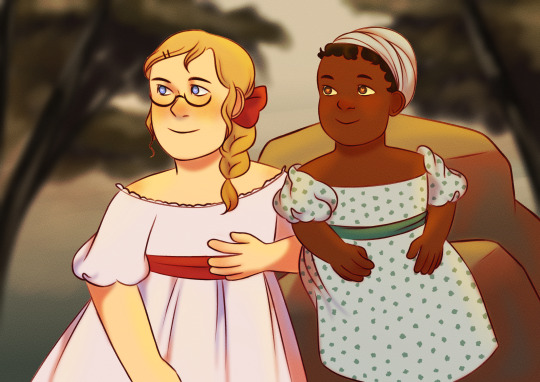
Back at it with the Regency AU! Here we have Francis' daughters, Genevieve and Michelle. They are the apples of his eye, and he dotes on them incessantly when he's not out at sea.
Genevieve (Monaco) is Francis' elder daughter and his only child with his late wife, Jeanne. She was born in 1801, so she's roughly nine when the story begins. Being without a maternal figure, she tends to emulate Francis, though more reserved than him. She also tries to act more grown up than she is largely because of Francis' military absences.
Michelle (Seychelles) is Francis' younger daughter. He had her out of wedlock with a free Seychellois woman living in France. She was born in 1806, more of an age with Arthur's children. She's very bubbly and sweet, and she hates it when Francis has to leave. She relies heavily on her older sister for guidance and emotional support.
Francis adores them both and when he's not spiting Arthur, much of what he does is to preserve his daughters' status and prospects. Having been through the turmoil of the French Revolution, and been a refugee, he only wants the best for them in everything. If increasing his own status and pushing for France's expansion can do that for them, then by God he will do it.
#hetalia#historical hetalia#regency au#my art#hws monaco#hws seychelles#hws france#fyi michelle is heavily based on figures like dido elizabeth belle/chevalier de st george/alexandre dumas#at least in terms of her upbringing#her outfit here is based on that portrait of belle actually#francis is very much so attempting to give her equal opportunities as genevieve does bc she's also his daughter and he loves her very much#also god help me i cannot draw adolescent kids for the life of me#toddlers and young kids i can do#but that 9-13 range is very difficult to me for whatever reason
75 notes
·
View notes
Text




asterion kingsbane: high prince of the oractiens and first king of the astran empire
born the youngest son of seven of on oractien peasant farmer, asterion led the oractien peasant class across the eastern coast of etos into a rebellion that nearly toppled the svetran empire and the zafiran federation. by the end of his nine year war, asterion personally took the head of the zafiran dragon’s head, forcing his successor to sign a treaty acknowledging the territorial independence of the oractiens upon pain of further war. after the war, he was given the name kingsbane for his ruthlessness against both empires. he lived until the age of 91, outliving both his wife and his son, upon whose death the title of heir apparent was passed to his nephew. despite his long life, asterion never once sired children, something legends credit as to being from a curse by the gods for the extent of his carnage.
#historical character time!#man i didn’t even know he would exist before ten minutes ago#but of COURSE i have to have a william-the-conquerer/aeneas/aexander-the-great expy in my high fantasy world!#and of fucking course he would be narcissistic enough to name the empire after himself#or maybe someone else did who knows#but!!!! this solves the question of the origin of tieflings and orcs#they’re the equivalent of normans/trojans and came to etos upon some great crisis in their homeland#maybe i’ll give them the rhoynar treatment and say they’re named after some river in their homeland?#astran empire#historical nps#royal npcs#i dont think he dies young though. he has a whole live to see yourself become so much worse arc and becomes odin like.#man really came to etos with his people as a refugee and said fuck it i am going to start an EMPIRE#arma virumque cano but its about him#fato profugo but its about HIM#oh my god he has a dido and a lavinia.
21 notes
·
View notes
Text
Dido | A Gift from the Sky
#music#dido#sizzle ohtaka#i think this is the perspective from a parent towards their young child ^.^#anyways i wont post the whole album rn...just my favs
5 notes
·
View notes
Text
"I'll always be alone, if I'm lying to you"


0 notes
Text
Like Our Summer (miniseries)


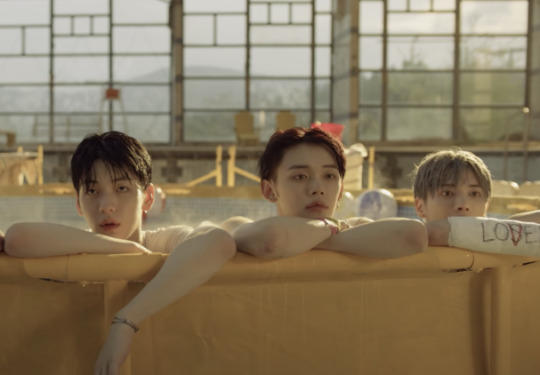
welcome to my 'like our summer' miniseries! each fic will follow one of the txt members across a series of events occurring in their summer. these stories are not connected in any way except for the fact that they are all written by me. any member mentioned in another fic is not the same member in their own fic.
any and every fic posted and linked to this masterlist will be smut, which means I don't want minors interacting with these!! 18+ only, please.
taglist [open]: @dido-of-the-endless @sunnibearr @boba-beom @fairyofshampgyu @wccycc @lexawoah13 @soobsfairy444 @suzirumas @notevenheretbh1
01:21am || choi yeonjun
sneaking out to the hotel pool after it's closed is probably the highlight of you staying with your boyfriend while his band is on tour
2k words
idol!yeonjun x non-idol!fem!reader
Maybe we should share? || choi soobin
first year as a counselor at this camp and you're already down bad for one of the other counselors. that was quick. and it's the head counselor? yeah, you're in too deep this time.
_k words
head counselor!soobin x camp counselor!fem!reader
Teach me- to swim, i guess? || choi beomgyu
finally deciding to take swim lessons was a big decision, in your opinion. your family had been pushing you to for years, and when you finally agree, they throw a PARTY. it's not that bad when you actually start the lessons- your teacher is a nice lifeguard only a few years older than you and she's patient with you when you're figuring things out. sucks for you that she doesn't show up to your second lesson, though.
_k words
perv!lifeguard!swim teacher!beomgyu x fem!reader
Pool Boy || kang taehyun
fuck your cousins for real.
you never would've noticed him if it weren't for them. you never would've thought he was cute if it weren't for them. and you sure as hell would not be getting off on one of the stupid jets of water in the pool if it weren't for them.
... okay, fine. maybe it's a little bit of your fault too. but if it is, it's most definitely his fault as well.
_k words
perv!lifeguard!taehyun x perv!fem!reader
12:01am || hueningkai
oh. he's cute. maybe a little young, younger than you'd usually like, but cute nonetheless. maybe your friends knew what they were doing when they dragged you to this club.
_k words
non-idol!hueningkai x chubby!noona!reader
(bonus) Three's a crowd || choi yeonjun and choi soobin
it started as a friendly vacation with your best friends, one you'd been planning ever since you found out the date they'd be done with touring and schedules for a while. But then the hotel gave you one room, with one bed, and... well, let's just say, no one's gonna be sleeping tonight.
_k words
idol!yeonjun x fem!reader x idol!soobin
#txt hard hours#txt hard thoughts#txt smut#adas hard hours#hueningkai smut#hueningkai hard hours#hueningkai hard thoughts#taehyun hard thoughts#taehyun hard hours#taehyun smut#beomgyu hard hours#beomgyu hard thoughts#beomgyu smut#soobin smut#soobin hard hours#soobin hard thoughts#yeonjun hard hours#yeonjun hard thoughts#yeonjun smut
384 notes
·
View notes
Note
for the old heads out there who are having a hard time with the modern system, splorpability is basically the same as grungliness but modified to be in line with the other stats.
splorpability 0-3 maps approximately to grungliness 100%-0%. it's mostly pretty clear-cut but you have to use your judgement when a GNG rate is in a weird place like 72.5% (fido dido)
Splorpability actually predates Grungliness. Grungliness was a metric introduced by advertisers in the 1980s, after Ronald Regan's administration deregulated the industry. It's why you'll hear "Grung-Factor" come up in a lot of conversations about He-Man, G.I.Joe, and Transformers - at least people discussing the classic versions of those franchises.
As the kids who grew up with it as a concept got older, so too did their relationship with Grungliness evolve. You use Fido Dido as an example, and a big part of the reason why a character with 72.5%G's didn't really pick up popularity until the 90's was because it was a concept that appealed more to teens and young adults, even if their appreciation of the character was mostly ironic.
Grungliness penetrated the public zeitgeist in such a wide-spread way that people sometimes make references to Grungliness without even realizing they're doing it. And it's a shame, because the concept was invented as a watered-down Splorpability so that they could target advertisements to children. You can SELL Grungliness.
Since this blog isn't interested in the commodification of little guys, we'll stick with Splorpability. We feel that it gives a more accurate representation of the subject.
383 notes
·
View notes
Note
Hola chicaa i have a request!
You’re a waitress in pedri’s parents restaurant so you know them for a while and pedri is slowly fallin in love with you🙈
Changed this up in the tiniest bit
This was rushedly ended and it's not revised, sorry if there's any mistake or misspelled word😭
El Bar Tasca -Pedri González
Summary: You're a worker in El Bar Tasca Fernando and managed to catch the attention of your bosses youngest son, Pedro.
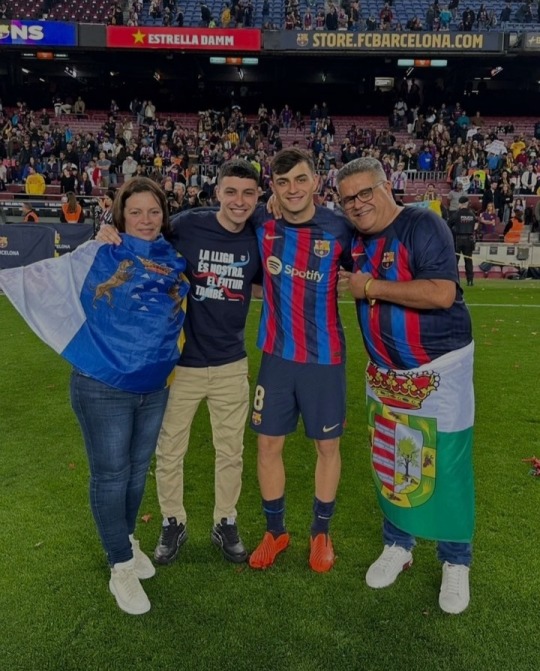
"¡Y/N, hija!" Fernando, your six months boss said with a smile on as you waved at him through the screen of your phone.
"Señor Fernando" You smile "¿Cómo están? ¿Qué tal Barcelona?" (How are you? How's Barcelona?)
"Pues todo muy bien" He smiled "¿Qué tal ha dido el día de hoy?" (Everything's good. How was today?) You nod smiling.
"Pretty busy but nothing la señorita Candelaria and I couldn't handle" You show the old lady into the camera as she smiles and waves "We're actually closing up now"
"Hombre, pues eso está muy bien. Me alegra mucho" (Man, that's really good. I'm glad) He smiled.
"¿Qué tal el partido? He visto que ya han levantado el trofeo, Rosy me ha estado enviando fotos de ustedes sin parar" (How was the mathc? I saw they already lifted the throphy, Rosy has been sending me pics of you nonstop) You both laugh "Fer me ha enviado un video suyo como guardametas" (Even Fer sent me this video of yours as a goalkeeper)
"El muy pillo me ha agarrao' fuera de base" (The smart one has gotten me when I least expected it) You laughed.
You knew about his oldest son, Fernando and often when he came here, you talked to him and the two of you spent nice time, laughs and jokes thrown all over the place, you chatted when he's at his Barcelona house and keeping a nice friendship but you still haven't met his youngest son, Pedro. With him being the star of the family, he was always busy and couldn't travel back home the same amount of time his brother did.
And now, he had won LaLiga and Rosy and Fernando were desperate to go and be with him but they were hesitant to leave the restaurant since their manager left but you told them you could take care for a few days of the Bar and tried to relieve some of their pression out. Of course, they didn't wanted to at first, not liking to put more pression on your shoulders, they knew you had work and Uni work and combined were a lot but you brushed their comments and grabbed the Bar's keys softly from Rosy's hold.
"Go and see your boys" You said "The Bar will be on good hands"
And they knew it would be. Even with the relative short amount of time you have been working there, they had grown to love you like a daughter and you love them like your second parents and they knew you were such a responsable, smart and overall good girl. That's why after a long talk of how they were going to make it up for you and you trying to dismiss it, accepted and left.
That's how you came here on the facetime thing, they didn't wanted you to pressure yourself and often Rosy or Fernando checked up on you with a message or a call, this time Fernando was truly excited that he called to show you around the whole place since he knew you liked football.
"¡Y/N, cariño!" You heard Rosy before you could see her but once you did you smiled brightly at her
"Rosy, you're looking gorgeous! I'm glad you're having a good time over there!" You replied excited
"We are, Y/N/N" She smiles "Have you seen this? Is gorgeous!" You nod lightly
"Fernando was showing me around a bit, it does look very hermoso" Rosy was about to talk but you soon saw Fer coming in, you first saw a part of his hand, then his hair and his eyes to finally see his whole face in a smile
"¡Señorita!" (Young lady!) He said as you giggle
"¡Señorito!" (Young man!) You reply
"Estos viejitos me han dicho que te iban a matar sino tomabas el puesto para que ellos pudiesen venir" (These old people told me that they were going to kill you if you didn't say yes to take care of the bar so that they could come) He said as Rosy hits him in the back of his neck
"Ya, déjate de payasadas, Fernando González Lopez" Rosy says as you laugh lightly
"Sí, deja esos cuentos pa'otro tiempo, están celebrando el triunfo de tú hermano, debería dejarlos pa' que sigan con ello" You said (Yes, leave those jokes for later, you're celebrating your brother's triumph, I should leave you guys to it)
"Oh no" Fernando says frowning "We wanted to keep showing you around and maybe meeting Pedro? He's taking pictures somewhere but-" You cut them off shaking your head
"Don't worry about it. I have to help Candelaria to mop and close the shop" You smile "You come back here in two days, right?" Fernando nods as you nod back "See you in two days!"
"Maybe you see us as well soon, Y/N! We'll go there when Pedro gets his vacation time, we can meet up!" Fer said pushing his head into the screen once more as you laugh watching his nose and big eyes appear on half of the screen
"That we'll do, Nandito. Se me cuidan, por favor" (Take care of yourselves, please)
"Igualmente, hija" (Likewise, love) Rosy says as you smile but seconds before you cut the call you could heard another Canarian accent speak
"¡Pedro!"
You sighed happy, those two grown-ups were absolutely the best and you loved them deeply, it didn't hurted you a single bit trading some of sleep time to catch up, do inventary, count the money and clean the whole Bar for them, instead of being stuck into a book alone at home whilst you wait for your parents to come from their work.
So you stuck your phone in the back of your pocket and went behind where the dishes were to keep doing your work.
"¿Estamos bien, señora Candelaria?" (Are we good, miss Candelaria?)
"Que nada de señora, mijita" (None of miss, daughter) You smile "And yes, we are all good" You nod accepting her hand
"Bueno, let's go then"
...
Everything was chaos.
Fernando and Rosy had came back three days ago and today Fer and Pedro were coming, they both were excited and all over the place, making you do this and do that, then sent you to the other thing and then other. You tried as much as you could but you were getting tired of running all over the Bar.
"Calm down, Rosy" You said "Everything will be fine, they're just your sons, they know this place top to bottom and in it's best and worst conditions. This is their home and all they would want is to relax, so please, with all due respect I suggest you to stop overthinking and take it easy"
"And she's right" An unknown voice said as you turn around finally facing the last and youngest member of the González López family "Que papá me había dicho que estabas un poco fuera de lugar, estresada y demás" (Dad just told me you were a bit out of place, stressed and everything else)
"I was a bit stressed out, you haven't been here in a long time, I just wanted everything to be perfect"
"And it is, mamá" He smiled before looking at you "Pedro" He pushed his hand out as you took it and you both gave two kisses in your cheeks
"Y/N Y/L/N" His eyebrows shot up
"Finally I get to met the awesome Y/N" He said as you blush lightly
"Bueno que asombrosa, asombrosa no soy" (Well awesome, awesome I'm not) "...Pero igualmente es un placer" (But anyway, it's a placer)
"What do you mean not awesome?" He says shaking his head "Que me han dicho las mil y un cosas de tí" (People have told me the thousand and one things about you)
"Good ones, I hope so" He laughs
"All good. I even got told por ahí que haces tremendas croquetas, incluso puede que mejores que las de mi mamá, he venido a comprobar eso" You laughed (...got told somewhere that you make tremendous croquettes, maybe even better than my mother's, I have come to verify that)
"They really are" Rosy says smiling as you look at her
"Oh shush! You were the one who told me the recipe, they are basically yours!"
"She adds a little something, we don't know what it is but she made the recipe her own" You blush "Gotta go and see if Fernndo needs something from me" And with that she left you guys
"Are you up to do them, right now?" You smile nodding
"Sure" You smiled grabbing your hair in a low ponytail
"Can I help you?"
"Wash your hands, then"
You instantly got into it, you gotta admit you liked croquettes too, often giving Pedri some indications of cutting the dresses and both of you asking question about the other, getting to know yourselves, your voice talking with Pedro and laughing at his jokes was the only thing you could hear at the kitchen and the ocasional sound of an electrodomestic.
"Oh vaya! What do we have here?" Fer said coming up "Pedro cooking?" He made a face making you laugh and the youngest González gave him a look and throw him a carrot peel "How's it going?"
"He is better assistant than you, so..." You said as Fer, who's face falls as Pedro laughs "We're going great"
"I'm better than him, you're only saying that because I don't follow your instructions!"
"I'm the chef here so of course it annoys me when I say put the chicken in the grill and you say: 'But let's do it baked'" You imitate his voice making him laugh "No! No, no, no! I want the freaking chicken grilled, I prepared it for the grill and you just went ahead and putted it inside the oven"
Fer came up to you to hug you but you didn't hugged him back "That was the best chicken I have ever done and you messed it up, get off!" You both laughed
"At least I help you, you're choosing to stay with the one who burns a simple pan con queso"
"I'll be looking at this so it doesn't burn, let him alone!" Pedro was laughing at your interaction with his brother
"Gotta go and so do you, Pedro. Dad wants us to greet people"
Now, that statement made Pedro furrow his eyebrows.
He was having a good time with you, he wanted to stay with you, get to know the girl his parents and brother were basically head over heels for and guess what you had that drew them this bad at you.
He had already seen you in pics and heard your voice when you talked with Fer but never got to meet you properly and now, after two hours of meeting, he never wanted to leave the kitchen if that meant you were besides him.
Without knowing it, he was already realizing what it was that thing of yours that drew him to you and he was also finding himself wanting to be around you, see your pretty smile and hear your laugh.
You were la chica más bonita, he has ever seen.
He didn't wanted to leave. Not when you just got to know each other and were having a good time.
"Do I have to?" Pedro asked
"Yes"
"I don't want to, I wanna stay here and help Y/N" Silence took over the kitchen when you broke it
"These are almost done, I just gotta cut the salad and it'll be ready. It won't take more than a few minutes so, why don't you wait outside? You precisely won't eat here in the kitchen and you have your old neighbours wanting to see you" You gave a solution and after he thought of it, nodded as you smiled lightly clapping
"Venga, vamos. Personal autorizado en la cocina" (C'mon, authorized staff in this place)
"Somos hijos de los dueños" (we are children of the owners)
"No me importa, acaban de decir que se van así que personal autorizado, dije" (I don't care, you just said you were leaving, so only authorized staff, I said) They laughed as you ushered them out
"Is it just me or you have a crush on her?" Fer, asked in a low tone to his younger brother once they were away from the kitchen
"Hombre, I just met her"
"Are you telling me you don't find her attractive at least, the tiniest bit?"
"¡Fua!" Pedri shook his head with a smile on "¿Atractiva? Joder, hombre; es la niña más bonita que he visto en mi vida" (Attractive? Fuck, man; she's the prettiest girl I've ever seen in my life)
"Yeah, I knew you were gonna say that" Fer smiled "She indeed is pretty, but not only she has looks, she also has this intelligence that's out of this world and the humility that she possesses... She's awesome" Pedro smiled "She has this internship in la Universidad Europea" Pedro opened his eyes
"La de Santa Cruz de Tenerife?" Fer nodded "¡Joder!" (Fuck!)
"I repeat, she's awesome and perfect for you, hermanito"
"Ya, ya. I got the point" Both brothers laughed as they came across their dad along a few of their old neighbours "¡Señor Juan!" Pedri exclaimed meeting the old man and meanwhile he was glad to be back in his hometown and see his people, all he wanted to be was back in the kitchen with you.
...
"Hope you like it!" You placed several plates in front of them as they smiled, thanking you
"Y/N, ven a comer con nosotros!" (Come eat with us!) Fernando said as you slowly shook your head
"You're having a family lunch, sir" You said "Besides, gotta keep working"
"None of that, I'm your boss and we're all family here. Take a little break, young lady" You smiled
"Venga, Y/N" Rosy says "Que es más, el fin de semana vamos a la playa, estás más que invitada a venir" (Even better, we're going to the beach this weekend, you're more than invited to come with us)
"Yes, she will be coming" Pedro replied before you could "Tengo que seguir conociendo a la increíble Y/L/N" (I have to keep knowing more about the incredible Y/L/N)
"You guys will end up bored of me"
"Nunca" (Never) The four of them said as you smile blushing
...
"¡Hostias!" You all laughed at Fer who fell and incidentally, a wooden stake was embedded in his foot. He limped towards Rosy who pulled it out as he yelled a femenine "¡Ay!"
"Told you to be careful!" Rosy said as you kept on laughing
"Y/N, how you learned to cook?" Pedro said taking to his mouth another croquette that you made "They're delicious!" You smile
"I've always loved it since I was a little girl" You smiled "My older brother was sick and my mom was doing this soup and I love that annoying guy so much I didn't liked seeing him down" They laughed
"...so I wanted to help and I started stirring and chopping some things with her help, of course. I didn't played a single thing but she said that I did and once my brother ate it, he started feeling better and I guess-" you lift your shoulders "I liked the feeling of him being healthy and happy for something I "helped" doing, I started to help her more and more, they played it off like I used to do everything until I did learned"
"I started cooking for real, I keep on loving it and I guess I combined my mom's, my grandma's cooking and I added to the mix my own stuffs, like throwing a bit of what seemed it could go good with to whatever I was doing" they laughed "I fell for this world"
"That's nice" You smile at Pedro nodding
"And you do amazing" Fernando said as you blush
"And of course, I'm mixing Rosy's and Candelaria's techniques and recipes into the mix as well" You laugh
"Oye, debes de darme la receta de ese pescado que haces" (You need to give me the recipe of the fish dish you do) Fer says "Little man here has this diet-that he's currently breaking at the moment with the amount of croquettes he has consumed" You laugh and Pedro lifts his shoulders
"¡Están buenísimas, hombre!" (They're so good, man!)
"Stop doing that, you will not get any muscles from it!"
"Yes, please, stop. I don't want to be the culprit of that happening" You said slowly taking the plate out of his hold
"Hey, hey, hey!" Pedro chanted going forward and grabbing three croquettes more "I will lose these" He says as you laugh
"Anyways" Fer keeps talking "He has to eat almost everyday fish and I keep thinking of the tastes it had and everything but I can't do it, it doesn't come nicely as yours... I need to know it!" You smile nodding
"Text me later and I will send it to you" You said grabbing a croquette "Ingredients and preparation"
"Ok, I'll try doing it and I'll text you how it goes"
"Or we can met up and do it?" Pedro proposed
"That also sounds good, that way I can see if you're doing something wrong" You smiled at Fer
"I already have this week busy with a few friends"
"I can go" Pedro said
"You don't know how to cook"
"Pero puedo aprender" (But I can learn) Fer was about to talk but Pedro interrupted him "It's done!" He turned to look at you "When are you free?"
"Sunday after 2pm and Wednesday"
"I'll be there on Sunday"
"Where will you be at if we haven't said anything from a place?" You smirked
"Well, we can meet up here in the beach and then we'll go anywhere for you to teach me how to do that fish dish" You nod "And then, we can go out if you'd like" You raised your eyebrows
"Go out?"
"Yes, you and I, go out" You duck your lips thinking. You only have four days knowing this guy but he wasn't joking around, subtly flirting with you any chance he gets.
And you won't lie and say you didn't find him attractive at all because, he was; in fact, you were flirting back most of the times.
"But that sounds like a date"
"It can be if you want to" You blush and smile widely, his parents were here and listening to the whole thing.
This boy.
"Oye, que no sé si sea buena idea salir con el hijo de tus jefes" (Hey, I don't think it's a good idea going out with your bosses son)
"Oh, que no te preocupéis por nosotros dos" (Oh, don't you worry about us two) Fernando spoke "We'll be more than happy if you date our son"
"Que ya eres parte de la familia, Y/N" Rosy says smiling
"¿Ves?" (See?) Fer jokes as you all laugh
"¿Y?" (And?) Pedro asks with a smile on as you slowly nod
"Pues... al parecer tendremos una cita" (Well, it seems like we'll have a date) You smiled back at him
"Y aprovechamos el miércoles para la segunda también" (and we take advantage of Wednesday for the second one too) You smirked
"Pero, ¿Y a ti quién te dijo que tendremos una segunda cita?" (But, who told you we'll have a second date?) He smirked winking at you
"Bonita, perderás la cuenta de las tantas citas tendremos en el futuro. You'll see" (Pretty girl, you'll lose count of the many dates we'll have in the future)
°°° °°° °°° °°°
Taglist: @gaviypedrisbride @stuckinaf4nfiction @elijahslover @azzpenswrld
#M. is writing#fc barca#fc barcelona#pedri gonzalez#pedri#pedri x reader#pedri icons#pedri gonzalez fluff#pedri fluff#pedri blurb#pedri one shot#pedri x you#pedri x y/n#pedri fanfic#pedri gonzalez icons#pedri gonzalez x you#pedri gonzalez x y/n#pedri smut#pedri gonzalez smut#pedri gonzalez x reader#pedri gonzalez imagine#pedri gonzalez blurb#pedri gonzalez fanfic#pedri gonzález icons#barca#barca fc
355 notes
·
View notes
Note
What are the most griddlehark songs looking for suggestions
Not to be basic but. Every basic alt pop song reminds me of griddlehark.
BAD FRIEND BY RINA SAWAYAMA. ALWAYS
Wastleland Baby by Hozier but also Francesca. I Know a Place by Muna. Running up That Hill by Kate Bush. Love, Love, Love by The Mountain Goats. It's Alright by Mother Mother. Hatefuck by Cruel Youth. Seven by Tayor Swift. Garden by Phoebe Bridges. Forever Young by Alphaville. Start a War by The National but specifically the Live in Brussels 2018 version. Te Ara Tika by Lorde. Kids by MGMT. Book of Our Names by Ezra Furman. AUATC by Bon Iver. Girls Against God by Florence and the Machine. White Flag by Dido.
#Anonymous#ask#INFLICTING MY TASTES UPON THE WORLD. SORRY IM BASIC#5#griddlehark#elle tlt posting#tlt
57 notes
·
View notes
Text
Jeff Buckley Revisited
by Simeon FlickMarch 2023
Remember me, but oh, forget my fate.
––Henry Purcell, “Dido’s Lament”
When Jeff Buckley drowned in the Wolf River tributary of the Mississippi on May 29, 1997, just as his band was arriving at the Memphis airport to start helping him finally nail down the long-awaited and already agonized-over second album, music lost not only one of its most singular and revolutionary of raw talents, but also the most mythologized—even during his lifetime—since Kurt Cobain’s death just three years prior. Buckley bore the boon and bane of being the scion of an also semi-famous and ill-fated folk/jazz/soul singer named Tim, and spent his entire life and career—following a single week-long reunion just before Tim’s 1975 death from an accidental heroin overdose—futilely trying to distance himself from the wayward father he never knew apart from the music of nine mostly half-baked studio albums. That an ever-growing number of people, the majority having discovered Jeff’s music post-mortem, feel they know the son better than he or anyone else knew his father, and still feel his loss as acutely as one would a dear family member, is a testament to the unparalleled emotional conveyance and lasting legacy of Jeff’s music despite having released only one official studio album during his lifetime (1994’s hauntingly gorgeous, seamlessly diverse Grace, which has found a home on innumerable “Greatest” lists and has been declared a personal favorite by many of his idols). Jeff Buckley’s influence lives on in the burgeoning underground cult of posthumous acolytes, and in the hyper-emotive, falsetto- and vibrato-laden, multi-octave vocal histrionics of so many subsequent singers, which only seem to come off as pale and obvious allusions that smack more of imitation than assimilation, much less embodiment, and we may never see his like again.
**************
Jeff Buckley entered the world during a meteor shower on the evening of November 17, 1966, the son of an already absent father and a mother, Mary Guibert, who at 18 wasn’t much more than a child herself. Like Cobain, who would arrive only three months later, Jeff had a typical Gen X childhood, replete with divorce, paternal estrangement and maternal domination, often violently reinforced alienation from his formative peers and unstable itinerancy (Mary dragged him through virtually every backwater town in California for all too short stints before he finally put his foot down in Anaheim, where both parents had grown up, and where extended family awaited). The sole refuge, besides the brief but stabilizing presence of the occasional father figure like stepdad Ron Moorhead, was the music men like him turned Jeff onto: Led Zeppelin, Joni Mitchell, Bob Dylan, and countless others who would seemingly become part of his DNA. Music became his north star, his raison d’être, and when things went wrong, which was all too often (Jeff had to be a rock for flighty mother Mary, taking on too many of her responsibilities too young), he would escape into it for hours.
This would compound once he took up the guitar. Like many children of musicians do, in order to carve out a distinct musical identity (and to maintain a healthy generation gap), Jeff—or Scotty, as he was known by his middle name then––gravitated towards Gen-X’s chosen instrument: the electric guitar, to the exclusion of his mother’s classical piano and his father’s acoustic guitar and vocalizations. Aside from the occasional lead vocal in a high school cover band, mostly for the high-ranged prog-rock and new wave classics none of his other bandmates could pull off, he considered himself just a guitar player in the ’80s. But not just any player; with Al DiMeola as one of many paragons, Jeff threw himself headlong into the world of virtuosic technique, teaching himself complicated licks by ear as he worked diligently to master not just the instrument but music itself.
This trajectory was maintained after his 1984 high school graduation with a stint at the derided Los Angeles organization, MIT (Musician’s Institute of Technology), with its many specialized subsidiaries, including GIT (Guitar Institute of Technology), where Jeff continued his musical edification. After obtaining his virtually useless professional certificate from GIT but with his gun-slinging reputation solidified a year later, he gigged in various area bands and worked as a studio rat, arranging and recording demos for other aspiring artists. But the lead vocalist in him remained as of yet dormant.
y the late ’80s it was already soul-crushingly evident that Los Angeles was a dead-end cesspool of intolerable immersion in other people’s music, and that a drastic change was required to sweep away the bad influences and external white noise to finally get him in touch with his own muse. New York City beckoned—just as it had to Tim in the ’60s—as a locus were people could become the epitome of themselves, get as weird as they wanted, and be unconditionally accepted or ignored as merely part of the scenery, and reach their full, rewarded potential in whatever their chosen field. Jeff tested the waters for a few months in 1990, but his money and options ran out, and he reluctantly returned to Los Angeles.
It wasn’t until April 26, 1991, when he performed as part of the Hal Willner-curated Greetings from Tim Buckley tribute show at Brooklyn’s St. Ann’s Church that he was able to lay the groundwork for a permanent relocation, having garnered the interest of several music industry types offering tangible professional succor, not to mention his first real girlfriend. That night marked the beginning of Jeff’s mythology-building not only as an artist in his own right, but also as an inextricable extension of his father’s legacy; many of the concert’s attendees were blown away not just by Jeff’s supposedly similar voice and delivery, but also by his physical resemblance (apparently there were some eerie backlit cheekbone shadows cast against the church hall walls that heightened the drama).
That there was so much defensiveness and/or mandated avoidance in so many subsequent interviews seems very bite-the-hand-that-feeds, but everyone has to break free from their parents at some point; that it often requires the assistance of those selfsame parents is a frustratingly ironic aspect of adulthood most of us have to face and embrace. Jeff simply had the misfortune of doing it in a highly scrutinized industry with zero—or even negative—expectations or tolerance of rock star progeny. He was also not only abandoned by his father, to whose funeral he was not even invited, but also projected on by Tim-obsessed fans and former love interests expecting the son to deliver on the father’s failed promise(s).
Jeff set up shop, and with the assistance of a demo tape of original songs he had recorded while still languishing in Los Angeles (courtesy of father Tim’s old manager, Herb Cohen), and a threadbare press kit (the only news clipping being a photocopied review of the Tim memorial show), he began beating the Manhattan pavement to drum up gigs and busk on the streets.
As of yet, short on original material, he leaned on sophisticated covers that resonated with his emphatically empathic and emotive spirit as he wall-pasta’d in search of a unique artistic identity. Songs by more recently assimilated influences like Nina Simone, Edith Piaf, and Leonard Cohen stood side by side with pitch-perfect deep-cut gems by Van Morrison and the beloved Zeppelin, with all-inclusive guitar arrangements that cast his different-every-time performances in full-blown Technicolor. His self-accompaniment on electric guitar as opposed to the acoustic form usually favored by the often excessively earnest—if not outright cheesy—solo folk artists of the past (including early-phase Tim), differentiated him from obsolete traditions, and it also broadcast the implicit message that this lone performer would eventually have a band behind him.
But the comprehensive guitar skill was just a tripod for the potent weapon his voice was becoming.
It’s difficult for most laypeople to differentiate between learned technique and natural timbre. Jeff didn’t inherit his father’s vocal gift; his was high-ranged and effeminate instead, with a thick palate and some huskiness occasionally muddying up his tone production. But what he did with it despite or because of the confines of those “limitations” is absolutely astounding. Instead of self-consciously diluting his delivery, he threw the book at it, almost as a diversionary tactic, like a magician smoke-and-mirror distracting his audience from an otherwise debunkable prestige move. With his uncanny imitative abilities and concomitant penchant for self-pedagogy, he adopted a rapid vibrato in accordance with essential influences (Simone, Piaf, Garland, and even father Tim, as was his undeniable birthright), nicked tricky classical and R&B trills and phrasing, turned his angelic upper register into a strength by frequently, often breathily leaning into his falsetto, incorporated various operatic (chromatic glissandos) and jazz (scatting) effects, learned how to push a full chest voice into his higher register like Robert Plant (and Tim) and to raggedly scream like Cobain and others of his generation. He ran sustain drills as he traveled across the city in cabs or on foot, drawing out his notes as long as possible to hone his deftly rationed breath support (just try holding out along with the 25-second E4 at the end of Grace’s “Hallelujah”). Tim had set the bar high for the younger Buckley, and Jeff rose mightily to the challenge, developing a comprehensive technique that kept pace with his guitar mastery, which had been pared down to unassailable jazz progressions and Hendrixian blues tropes and, like Cobain, would feature downplayed––if any––solos for the duration. If Jeff’s musical continuo was a haunted house, his voice had become the ghost that lingered within it.
(There’s something more compelling about the resulting output of singer/songwriters who start out exclusively as instrumentalists; it makes for more effective and meaningful musical accompaniment and better structured songs, and they tend to work more diligently and eruditely at mastering vocal technique. Tim leaned almost exclusively on his phenomenal voice, and insufficient thought was given to structure and harmony in his songs, and the lyrics were by turns predominantly unremarkable or unwieldy, the main drawback of being able to sing the phonebook. The resulting chord changes and accompaniment were more limited, derivative, yet ironically more obtrusive. Jeff had harnessed hooks, vivid and compelling lyrical imagery, and upper harmony into underlying works that left room for everything important, but especially the vocals. Thus, Jeff managed to achieve with one album what Tim failed to do in nine; he produced a timeless classic.)
Jeff’s most crucial influence––his self-declared Elvis––was the Qawwali singer Nusrat Fateh Ali Khan. Qawwali singing introduced Jeff not only to its mystical eastern harmony, which was a subtle but unmistakable undercurrent in his guitar parts and his music in general, but also to a highly freeing ilk of vocal improvisation he would use to sparing but profound effect in his live performances, most notably in his wordless vocal warm-ups for things like “Mojo Pin” and “Dream Brother,” and in the way he would subtly tweak the songs’ melodies from show to show.
With all of this gelling within and beginning to burst out of him, Jeff flogged his wares at many a Manhattan venue, but he would find his symbiotic Shangri La at Sin-é, a hole-in-the-wall café run by a fellow man of Irish descent, ex-pat Shane Doyle. Jeff crystalized into the self-accompanying male diva he had been striving to become there at Sin-é and found a home away from home not only on the small stage, where he reveled in an unparalleled, as-of-yet anonymous freedom within the material, but also behind the counter, where he could often be found washing dishes.
This is where Jeff’s buzz began to build, thanks to his Monday night residency, the impression he had made on the industry folk at Tim’s memorial concert (including several Columbia employees who started showing up on the regular), and the steadily growing crowds comprised predominantly of young women. As word of mouth spread and audiences began to overflow onto the sidewalk, the higher-ups at several major labels started circling to investigate the fresh blood in the water. A hilarious bidding war ensued, with record company execs actually trying to make table reservations at the tiny walk-in café, and the street’s curbs clogging with limousines. Jeff would end up signing with Columbia, a Sony subsidiary that was home to many of his heroes, and that made all the right overtures and promises to this hot young talent who was desperately intent on accomplishing the impossible feat of using and defeating the music industry from the inside, as opposed to being consumed by it like his father had been.
**************
Jeff’s “million dollar” deal––consisting of a $100,000 advance, a higher than normal royalty rate, and a three-album guarantee––was unusual for a solo artist of that time, considering there were scant few original songs, no band, and no official demo tape to speak of (the L.A. recordings, which Jeff in his humorously nihilistic cups had dubbed The Babylon Dungeon Sessions, technically fulfilled the applicable criteria but weren’t aurally suitable). Columbia knew they had a hot property on their hands, the Gen-X manifestation of a Dylan or Springsteen-esque heritage artist, and Jeff made sure they knew, mostly through intentional late arrivals to countless business meetings. But because his talents spanned so deep and wide, everyone was initially at a loss as to what form his recorded output should take. What the hell do you do with an artist that has the chops and versatility to go in any direction??
The logical first step was to try and capture the solo version of Jeff on tape and issue it as a soft introduction. Live At Sin-é was culled from two performances recorded during the summer of 1993 and released on November 23 as a perfunctory, slightly disappointing four-song EP consisting of two originals (“Mojo Pin,” and “Eternal Life,” both of which would get definitive, full-band versions on Grace), and two covers (a rhapsodically incendiary rendition of Van Morrison’s “The Way Young Lovers Do” and a transcendent reading of Edith Piaf’s “Je N’en Connais Pas La Fin,” complete with a fingerpicked merry-go-round guitar waltz for the French-sung refrain).
In Columbia’s posthumous ambition to exploit remaining vault caches to continue paying down Jeff’s sizable debt to the label, the original release’s felonious dearth was rectified with 2003’s Legacy Edition, a two-disc, one DVD set that was a much more complete representation of Jeff not just as an artist during that pre-fame period, but as a person. Along with scads more songs from the same shows, the expanded set includes between-song banter that manages to do what his scant, more visceral studio work couldn’t: put his pronouncedly nerdy, madcap, sometimes salacious sense of humor on full display.
Meanwhile, Jeff had also begun working toward his only completed studio LP. Sony had brought him in to record the lion’s share of his repertoire in February of ’93 as a way to gently kick off the A&R cataloguing and selection process for the album (these were later released as part of the 2016 compilation You And I), and recording sessions were scheduled for September at Bearsville Studios, which was located near Woodstock in upstate New York. The only problem––and it was a big one––was that he didn’t have a band. Like so many other aspects of Jeff’s career, this got rectified at the last possible moment; he met and connected with bassist Mick Grondahl first, then drummer Matt Johnson less than a month out from the initial recording dates.
A tall, dark, and handsome Dane, Grondahl had an ideal combination of low-key receptiveness and musical adventurousness that allowed him to be the perfect on- and offstage wingman: he was interesting in an unobtrusive way. Johnson was a wet-eared Texan who had the ideal balance of power and precision (a slight and diminutive presence, Johnson’s physicality was bolstered by his construction day job) and the breadth of taste and experience to match the extreme dynamic variations of Jeff’s sonic palette (Johnson could crush it like Bonzo or play pindrop-soft like a seasoned jazz pro––whatever the music required).
Columbia was less than pleased that Jeff had recruited a rhythm section with virtually no stage or studio experience, but he would eventually be proven right in his selection of introverted, lump-of-clay rookies that doubled as a gang of friends who could hang with him in every sense, especially through all the spontaneous twists and turns he threw at them. This was one of many battles he would actually win for the better against Sony, though he would initially come off as the loser (it took a few months for the band to get up to speed on the Grace repertoire, because they rarely if ever played the album’s songs during rehearsals or soundchecks, preferring to fill that time with “jamming,” since they needed to build an intuitive rapport. They also knew they would be playing the same emotionally demanding songs night after night for the next year or two).
The trio began work on Grace at Bearsville Studios, which had been pre-rigged with several different recording environments to spontaneously capture whatever came out of Jeff and his band in any permutation and style, whether it was solo, low-key jazz combo or full-on rock group. Andy Wallace, who had dialed in the mixes for Nirvana’s Nevermind, wore the coproducing and engineering hats for these sessions, along with providing a regimented lens through which to focus and refract Jeff’s chaotic genius. Recording proceeded slowly and steadily, without too much fanfare, but then, again at the last minute there was an explosion of prodigious productivity. Among other developments, German vibraphone prodigy Karl Berger was in town, and with the assistance of a local quartet, he and Jeff co-arranged string parts for “Grace,” “Last Goodbye,” and “Eternal Life.”
The eleventh-hour burst of creativity suddenly began transforming Jeff’s modest debut into something more akin to the fully produced masterpiece that usually doesn’t happen until later in a discography. More studio time was booked for intensive overdubbing of additional layers, which pushed costs beyond the initial budget, and though Columbia held Jeff in high esteem and generally handled him with kid gloves (full artistic control was implicit), the majority of expenses went into his recoupable fund, which had to be paid down by Jeff through album sale royalties. Though Grace would eventually prove itself beyond worthy of the investment, this was one of the first major manifestations of Jeff’s Sony-sourced headache that would plague him for the duration.
Grace, which was finally released on August 23, 1994, tends to vex the neophyte at first blush. There’s so much to unpack, the resulting bottleneck can be off-putting. Only through repeated listens will it reward those who “wait in the fire,” as the title track has it. Once that rote assimilation has inured you to Jeff’s eccentric voice and anachronistically innovative affectations, and Grace has dilated your emotional receptivity wider than you ever thought possible, you will tend to listen obsessively for a while before you realize you need to take a break so your strung-out, wrung-out heart can snap back to normal. You will probably only be able to listen to it every once in a while thereafter, as the lachrymose music makes demands of your psyche that require exceptional equanimity to withstand (the irony is that while Grace might help you grieve a breakup or death, listening to its ten tracks can also exhume that grief long past the time you have worked through it). The fact that Jeff is no longer here but still sounds undeniably alive in the speakers, and that the making of this album led to insurmountable expectations for a satisfactory follow-up that added to his pre-death stress, only augments the album’s haunting intensity.
The sonic progeny of Robert Johnson, Nina Simone, Edgar Allan Poe, and John Dowland, Jeff comes off as the wide-amplitude, tragic-romantic, card-carrying Scorpio that he was, irresistibly obsessed with love and death, singing often of the moon and rain (and yet also of burning and fire), and bedroom-as-sanctuary-and-wellspring, and a melancholic, nearly heart-rending yearning for absent lovers past and present. All of this can’t help but feed into his steadily growing mythology, not to mention strike he’s-all-alone-and-vulnerable-go-save-him reverberations of longing through the heartstrings of every heterosexual female within earshot, while also getting straight men of all walks gratefully as in touch with their feminine side as he was. In the age of grunge––which force-fed emotion through intimidating volume and distortion––Grace was an anomaly, delivering a wider range of feeling through a listener’s induced surrender to its heightened peaks and valleys, with Jeff’s by turns angelic and demonic voice keeping pace, and, unlike Cobain, with absolutely no irony to lean on, hide behind, or use as disclaimer.
“Mojo Pin” is the perfect overture for an audiophile quality album with such wide yet still somehow cohesive style and dynamic oscillations, with softly looping guitar harmonics fading in, followed by a wordless melody delicately sung over a fingerpicked folk/jazz guitar pattern. The music rollercoasters from there, with dramatic stops featuring vocal melismas that proceed into straight 4/4 time, finally crescendoing in a loud, climactic buildup, and a ragged scream from Jeff that tapers seamlessly back into the jazz feel.
The first stanzas tell us so much about the author:
I’m lying in my bed, the blanket is warm
This body will never be safe from harm
Still feel your hair, black ribbons of coal
Touch my skin to keep me whole
Oh, if only you’d come back to me
If you laid at my side
I wouldn’t need no mojo pin
To keep me satisfied
Here we find a vividly lovelorn artist who tends to compose from the subconscious (as with many of his original songs, “Mojo Pin” was inspired by a dream he had had) has already begun confronting his mortality, equates love with addiction like so many troubadours before him (“mojo pin” is a euphemism for a shot of heroin, which, inspired in part by his father, Jeff used for a short time during the tour in support of Grace), and feels hopelessly separated from it all, with a heightened sense of longing that can’t help but garner the listener’s sympathies.
The title track picks up the thread in more ways than one; along with “Mojo Pin” it is the second of two pre-Sony songwriting collaborations with former Captain Beefheart guitarist Gary Lucas—as part of his short-lived Gods and Monsters project (that’s Lucas’s guitar-noodle wizardry on both). And with lines like “Oh, drink a bit of wine––we both might go tomorrow,” it ups the mortality-as-enabler-and-aphrodisiac ante.
With its churning 6/8 groove, and with Jeff starting the song in typical fashion––toward the bottom of his discernable vocal range (D3), “Grace” culminates cathartically on a sustained, heavily vibrato’d, full-chest E5 bad-assedly blasting from his manic larynx and also marks the first of several ominous allusions to being harmed by water (“…And I feel them drown my name…”).
“Last Goodbye” was supposed to be the big first single. It even got an MTV video treatment (just look at his dour expression as he and the exhausted band take a precious day off from a European tour to do this exorbitantly expensive production of a compromised artistic concept in a despised medium), but with no real chorus to speak of, its chart success was modest at best. A Delta blues slide glides across an open-tuned electric 12-string guitar before dropping into a mid-tempo dance groove and a lyric full of bittersweet memories of a failed relationship with an older woman in L.A.
Not only was Jeff a bit shorthanded when it came to filling an entire 52-minute album with originals, but it also would have been a shame not to round out the running order with some well-chosen and interpreted covers in emulation of the intimate immediacy of Jeff’s Sin-é days. The first of these appearing on Grace is “Lilac Wine,” a torch-song standard written by James Shelton and adopted by Nina Simone. Jeff gives the distant-lover-as-intoxicant lyrics the hyper-emotive treatment, with perfectly sustained vibrato on the drawn-out notes and with his voice occasionally breaking into a heartrending sob, especially on the line, “…Isn’t that she, or am I just going crazy, dear?”
“Lilac Wine” is a significant indication of the barely fathomable depth of Jeff’s––and by extension, the band’s––versatility and their ability to do exactly right by the artist and repertoire (it’s difficult, in that sense, to listen to any of Tim’s records without taking umbrage with the musicians in the various band incarnations smothering Tim’s voice and stepping all over his 12-string guitar with their ego-fulfilling and poorly––if at all––thought-out parts).
“So Real” represents not only the successful search for a second guitarist, but also a tenacious battle fought and won against Columbia for the very soul of the album.
Michael Tighe, a mutual friend of Jeff and his ex Rebecca Moore (the one he had met and fallen in love with at the Tim tribute, and whom “Grace”s lyrics supposedly feature) joined the band on second guitar after most of the work on the album had been completed, and he brought an intriguing set of chord changes with him. When it came time to record B-sides and possible non-album singles (a cover of Big Star’s “Kangaroo”, which, to Sony’s consternation would often stretch out to 15 or 20 minutes in concert, was also laid down), Tighe’s progressions, which were inordinately sophisticated considering he hadn’t been playing guitar for very long, were dusted off, tracked with engineer Cliff Norrell, and Jeff did the lead vocal in one take after a last-minute walk to finish the lyric.
Distinguished by the verses’ seamless changes in meter (back and forth from duple to triple time), its by-now standard mélange of tragic-romantic imagery in the lyrics (“I love you / But I’m afraid to love you,” and the foreboding “And I couldn’t awake from the nightmare that sucked me in and pulled me under…”), another wildly climactic E5 at the end, and a massive chorus hook, the song fit Jeff’s MO––accessible innovation and wide-amplitude expression––perfectly.
So much so that it quickly shed its B-side status and usurped a coveted spot on the record from another, highly contested original: The excessively personal and harsh “Forget Her,” which in retrospect would have been the sole manifestation of irony on the album. Jeff was justifiably dissatisfied with this disingenuously caustic 12/8 blues-pop dirge waltz he had allegedly penned about the aforementioned, hapless Moore, upon whom the lyric displaced Jeff’s own culpability for the relationship’s dissolution. But the label was head over heels with it, as the song’s melodramatic, Michael Bolton-esque chorus made it the one and only potential crossover smash in their minds. Columbia exec Don Ienner, who was essentially Jeff’s boss, tried everything short of bribery to futilely sweet-talk Jeff into keeping it on the album, which, in itself, was a tangible reason for Jeff to dig in, though he also feared that the slightly smarmy song would be a one-way ticket to One-Hit-Wonder-ville. As it turned out, “So Real”s chorus was hookier anyway, enough to warrant its own video treatment, though its subsequent commercial impact was also negligible.
A plaintive sigh kicks off what is now widely regarded as the definitive recording of Leonard Cohen’s “Hallelujah,” the second cover of the album, performed solo and glued together from multiple takes into a solemn paean to the ecstatic pain of long-term relationships. Inspired by John Cale’s 1991 reading, Jeff sticks to the ultra-romantic verses that find love and suffering linked in paradox, and the guitar tone and reverb augment the song’s church hymn vibe, almost as though it was recorded at a service or funeral. If you’ve heard this recording or noticed it in myriad movies and TV shows and haven’t cried at least once, you’re not human.
“Lover, You Should Have Come Over” is a classic swinging blues adagio, perhaps the best known and most covered original on the album. Water and death are linked once again (“Looking out the door, I see the rain fall upon the funeral mourners / Parading in a wake of sad relations as their shoes fill up with water…”), and then Jeff abruptly breaks that train of thought to do right by Moore in recognizing his role in their breakup (“…Maybe I’m too young / To keep good love from going wrong”). Again, his vocal starts low and builds to another E5 at the end. In the hands of another artist, all of this would have sounded forced and over the top, but somehow Jeff was able to make it work. That’s his genius/madness; he himself was fully dilated and committed in a way that wasn’t healthy or sustainable, but damn, did it make for visceral listening.
“Corpus Christi Carol” reaches even further back than 1950’s “Lilac Wine” and completely blows the listener away with its expectation-defying display of musical depth. He becomes a bona fide classical singer here, exhibiting total immersion in the anonymous 16th-century lyric that the aptly named English composer Benjamin Britten incorporated into 1933’s Choral Variations for Mixed Voices (“A Boy Was Born”), Op. 3, finally arriving at Jeff’s adolescent ears through the version for high voice recorded by Janet Baker in 1967. Jeff completely inhabits the allegory of a bedridden, Christ-like knight endlessly bleeding, witnessed by love and the purity of his cause, with the empathic delicacy that was already his trademark. The stark arrangement for electric guitar and scant overdubs is superbly matched by the lamenting vocal, which ends on a ghostly, falsetto’d E5 that is utterly cathartic in its climactic glory.
Jeff wanted to make an album that compelled rock fans to forget about Zeppelin II, and “Eternal Life” delivers on the heavier side of that promise. Written during his time in L.A., the creepy intro stops on a dime before a bludgeoning, yet highly danceable groove drops in and a reactive lyric confronts applicable listeners to wake up and smell the mortal coffee:
Eternal life is now on my trail
Got my red-glitter coffin, man––just need one last nail
While all these ugly gentlemen play out their foolish games
There’s a flaming red horizon that screams our names…
Racist everyman, what have you done?
Man, you made a killer of your unborn son
Oh, crown my fear your king at the point of a gun
All I want to do is love everyone…
There’s no time for hatred––only questions
What is love, where is happiness
What is alive, where is peace?
When will I find the strength to bring me release?
With distorted bass as well as guitar alongside complementary strings and a killer groove featuring a highly effective, accelerating hi-hat pattern from Johnson on the verses, the song successfully proselytizes for universally incontestable causes, and reinforces Jeff’s projected mythology as a doomed soul whose seemingly relished fate awaits him sooner rather than later.
“Dream Brother” may be the last song on the album, but it was the very first idea Jeff and the band had worked up together. At the risk of overusing the word, and just like the album as a whole, it is haunting from start to finish, with a droney, string-cranking intro giving way to an eastern-inflected guitar motif. Jeff’s more static but no less sublime vocal melody goes beyond complementary; it builds tension by hanging on or around the fifth for most of the verse stanzas before resolving to the tonic on the last note of the phrase. Grondahl’s bass line, as with all his work on the album, is a sublime treat; here we find him working his way through the exotic Phrygian mode, recasting the guitar parts into a harmonically complex, emotionally compelling accompaniment that perfectly underpins the vocal.
The song features another penned-and-sung-at-the-last-possible-minute lyric, the chorus of which admonishes dear L.A. friend Chris Dowd (of Fishbone) not to abandon his new family like Tim had Jeff and Mary: “Don’t be like the one who made me so old / Don’t be like the one who left behind his name / ‘Cause they’re waiting for you like I waited for mine / And nobody ever came.” Grace’s only allusion to Jeff’s father builds in intensity to an instrumental bridge with wordless Qawwali wailings that are utterly bone chilling in their echoing-into-eternity saturation. The album’s final line puts an ominous capstone on the pyramid of the untimely-death-by-water preoccupation: “Asleep in the sand, with the ocean washing over…”
PART TWO
From ’94 to ’96, both solo and with the band, Jeff Buckley toured the world and elsewhere. Those two years were highly transformative; he met and/or was lauded by so many of his personal heroes (including Zeppelin’s Page and Plant, Paul and Linda McCartney, U2’s Bono and The Edge, David Bowie, and he had a brief affair with Elizabeth Fraser of Cocteau Twins and This Mortal Coil, who had covered Tim’s “Song to the Siren” [for aural proof of the romance, go to YouTube and check out their unfinished, embarrassingly smitten PDA duet on “All Flowers in Time”]), picked up an all but unshakeable smoking habit as a late-blooming extension of delayed formative-year rebellion and as a temporary, self-harming relief from the stresses of touring and just-shy-of-A-list fame (he managed to make People magazine’s 50 most beautiful list in May of ’95, which mostly appalled him, and also had an eye-opening night out with Courtney Love), turned down numerous primetime opportunities—SNL, Letterman, and acting roles and commercial placements—in favor of “underground” platforms like MTV’s “120 Minutes,” and was constantly at odds with his record label.
Australia and France embraced him like a returning hero, with the latter country’s Académie Charles Cros presenting Jeff with the rarely-awarded-to-an-American Grand Prix International Du Disque in honor of Grace on April 13, 1995 (two live shows, the second representing a career peak, were recorded during a French leg of the tour and later released as 1995’s Live at the Bataclan EP and 2001’s Live à l’Olympia).
The tank ran dry on March 1, 1996, which marked not only the final date of a hastily booked Australian/New Zealand tour to capitalize on Jeff’s surging popularity there and subsequently the last in official support of Grace, but also the final show with percussionist Matt Johnson, who had reached his hard limit with the band leader’s exacerbated lifestyle excesses and reckless behavior, not to mention Jeff’s escalating hazing of him.
Drummerless and exhausted, a different Jeff Buckley returned to a different New York. Though it suited his dysfunctionally nomadic, reactively noncommittal spirit, touring is not conducive to one’s mental or physical well-being nor is any level of fame, which is unfortunately what moves the units at the cost of anonymous normalcy. As a result, Jeff could no longer frequent any of his old haunts without being recognized and approached by strangers who thought they knew and deserved a piece of him beyond his timeless music. But then even his friends couldn’t help but feel jilted in their wanting a less ephemeral friendship with him, as he made them feel like the undeniably corroborated center of the universe when he was around, having given of himself interpersonally as completely and unadvisedly as he did in his music.
With inchoate fame now cutting him off from his usual decompression options, Jeff couldn’t recharge his psychic batteries. That coupled with the fact that Columbia and the press had been persistently hounding him regarding a follow-up to Grace piled even more pressure on the stress heap, further hampering his creative process and making The Big Apple taste more of the cyanide within the seeds than the once novel fruit of clandestine self-discovery.
There’s an industry saying: a recording artist has their entire life to make the first album and six months to make the second. Already no stranger to writer’s block under normal circumstances (he was inherently a better interpreter than a composer and understandably loath to commit to locked-in versions of anything), Jeff found himself hitting the creative wall in the midst of his increasingly stifling paradigm. The new songs were coming, albeit more slowly than everyone preferred, and in a different, more current vein than Grace. Having kept an ever-vigilant ear to the cultural ground, Jeff had met the Grifters and the Dambuilders while on tour, gaining a new love interest—Joan Wasser, to whom he related early on that he was going to die young—from the latter band and befriended Nathan Larson of Shudder to Think, and their contemporary alternative rock vibes ignited a light bulb over Jeff’s head, giving him the inspiration to pursue a rawer sound, much as Cobain had for Nevermind’s 1993 follow-up—In Utero.
It wasn’t necessarily Sony’s cup of tea. Though the label was by no means dead-set on putting out Son of Grace, they were a bit befuddled by the significant shift in musical mores away from the classic heritage artist sound toward the aural marriage of the Smiths and Soundgarden evident in the newer material. His sagacious selection of classic solo repertoire, and Grace by extension, had gotten Jeff’s foot in the door, as their sophisticated old-school values were arguably a premeditated affectation on Jeff’s part to woo the industry’s boho Boomer gatekeepers into signing and unconditionally supporting him. Now that he was more or less ensconced on the inside, and having gained more than a little leverage from all the hard work of the past year and a half, Jeff wanted to change things up to reflect more of what he’d been listening to and writing as an artist of his own generation. Though jumping high through Jeff’s hoops was by now second nature, Columbia was nevertheless befuddled.
This vexation next manifested as bewilderment over the choice of legendary Television alum Tom Verlaine (RIP) to aid and abet his alt-rock vision as the inexperienced coproducer for the second album. No one at Sony thought Verlaine was the right man for the job; they would just as soon have gone with Andy Wallace again rather than someone who, as with Grondahl, Johnson, and Tighe, didn’t have a track record to speak of. Whether or not Jeff’s choice was ill informed was irrelevant; it became his new crusade against the label, a pyrrhic war waged solely on the principle of getting his way even if it ended up biting him in the ass.
Columbia green-lit some bet-hedging recording with Verlaine to humor Jeff, but also to surreptitiously gather leverage as a failed, debt-enlarging investment, as the odds were slim that he could pull another rabbit out of his hat within the limited, impossible-for-Jeff parameters. Two brief as they were dissatisfying sessions occurred at various New York studios in 1996 and then a third at Memphis’s Easley McCain studios with Johnson’s permanent replacement, Parker Kindred, in early 1997. Jeff had become interested in recording at Easley through Grifters guitarist and Memphis resident Dave Shouse, and in relocating to that hallowed town for its legendary status in the history of blues and rock ‘n roll, and yet also as an escape from the lost anonymity, label pressure, and detrimental distractions of New York.
Jeff began striving for—and was at least able to temporarily reclaim—some semblance of a normal life in Memphis; he settled in at 91 Rembert Street, where he could often be found lying in the overgrown grass of his front yard, staked out all the good local restaurants, got a Sin-é-reminiscent Monday night residency at a downtown venue called Barrister’s, proposed marriage to Joan Wasser, and spent time with local friends who didn’t treat him like a rock star. At the time of his death, and as this evidence indicates, Jeff was trying to settle down, but he also felt ready to finally nail the landing on the second album, which he earnestly hoped would not only eclipse Grace but would frighten people as well. He was also noticeably uneasy.
The iteration of what was going to be called My Sweetheart the Drunk that came out almost too soon in May of 1998, not the barely attainable one Jeff would have overworked himself to complete had he lived, is the version the label should have agreed to put out had he been willing and able to play the long game. Though disc 2, with the exception of “Haven’t You Heard” and the cover of “Satisfied Mind,” is mainly for diehards (it contains sloppily recorded and produced home recordings that only hint at greatness, as well as superfluous original mixes of select disc 1 material), the ten Verlaine tracks are nothing to scoff at. In fact, the minimally but still excellently arranged and produced songs not only sound surprisingly finished, but would have also found Jeff paving the way for the future of alternative rock/pop in a manner that was more in touch with the times but still rang true to Jeff’s old-school tragic-romantic sophistication. Hindsight finds these recordings nothing to be ashamed of, the natural, expectation-managing and yet still promise-fulfilling continuation of Jeff’s artistic journey, though he didn’t—and wouldn’t—agree with that assessment (the tracks probably could have used just a little more tightening up… At the very least, and as it stands, disc 1 of My Sweetheart the Drunk could have been a highly respectable and acceptable “sophomore flop”). Jeff would have had to ease up on the malignant perfectionism had he lived, and in that light it both does and doesn’t seem strange that he continued massaging these recordings—with additional overdubs and polishing occurring at Easley after the band’s return to New York—despite his clearly declared intention to abandon what he had already recorded, concede defeat regarding Verlaine (who urged Jeff to erase the tapes), and start from scratch with Andy Wallace.
Sketches for My Sweetheart the Drunk has plenty of wide-amplitude thrills (“Vancouver,” which started life as an instrumental break on the Grace tour, now featured a soaring vocal that found him suddenly clued in to the detriments of giving too much of himself: “I need to be alone / To heal this bleeding stone…”), lots of tragic-romantic flair (the beautiful, minimally orchestrated ballads “Morning Theft” and “Opened Once,” the swinging caveat “Witches Rave,” and the macabre, “Come as You Are”-ish “Nightmares by the Sea” are by turns self-castigating and wary), more struggle over suitable repertoire (Jeff harbored hypocritical paranoia that the set-apart, slinky R&B slow-jam, “Everybody Here Wants You” would be chosen as a single against his wishes [it was], even though the song is an instant classic, and the album could have done without the cover of the Nymphs’ “Yard of Blonde Girls,” though he didn’t trust Columbia to agree), two Qawwali nods (the mantra jam “New Year’s Prayer”, and the utterly harrowing “You And I”), and plenty of fodder for precognition-of-untimely-death speculators (“Stay with me under these waves tonight / Be free for once in your life tonight…” from “Nightmares By The Sea”, and “Ah, the calm below that poisoned river wild…” from the goosebump-evincing “You And I”).
**************
Recording contracts have always been a Faustian bargain for the artist, especially at the onset, when it is weighted heavily in the card-holding label’s favor. Art and commerce often meet in the cultural-industrial ring as irreconcilable spouses who stay together for the kids, with the artist wanting to make a unique, challenging, and hopefully timeless statement for theirs and successive generations, and the label needing to make a profit, not lose their shirt, or just break even. The latter often requires innocuous music that has been dumbed down or otherwise compromised for mass consumption, usually the antithesis of the former. The artist, though, according to the standard contract they signed, is legally beholden to the label, which owns the master recordings and the right to exploit them until such a time, often years or even decades down the road, when the artist has gained enough cachet through account-balancing sales and accumulated cultural pertinence to renegotiate the contract into a more equitable form that befits their too-hard-earned stature. As with life in general, and back when labels were still labels, one had to play a patient, penitent, somewhat circumspect long game, with eyes intent on the future prize in order to succeed as a recording and touring artist, and to eventually win out over the label.
Bob Dylan and Joni Mitchell, now in or on the cusp of their 80s respectively, managed to successfully undergo and even control their fame-reconciling heritage artist transformations and break through to the other side. Jeff Buckley, who realized too late and too far out to sea that he had given up essential access to a normal life, and whose DNA and hardship-forged personality was geared for fleeting, heightened moments of impulsive escape and unrealistic levels of emotional outpouring during which there was no tomorrow, did not. After an itinerant childhood in a chaotic, single-parent household, neither of which allowed him any bonded, bolstering long-term friendships or gave him the necessary emotional support to instill enough confidence to enable him to pace, self-nurture, and recharge as an adult, Jeff was predestined for burnout. Add to this the looming legacy of his father’s similarly self-inflicted and untimely doom, the demoralizing fiscal and creative debt to—and incongruent association with—a major label, and pervasive generational nihilism, and you have the recipe for a death by misadventure.
The world generally eats pure-heart-on-sleeve empaths like Jeff Buckley for breakfast, and just like house-always-wins Vegas casinos, record labels are particularly good at exploiting, devouring, and then remorselessly shitting out their charges no matter how vigilant the artist may have been to the contrary. In Jeff and Columbia’s case, it’s difficult to pick a winner; dying got him out of both having to deliver on a second album and pay off his way-in-the-red recoupable, but his absence-generated popularity and Sony’s dogged determination to monetize ample vault caches in the aftermath may have balanced the ledger by now anyway. Either way you slice it, and for what it’s worth, the artist is gone, and Columbia is a tawdry shadow of its former self, but Jeff’s timeless music remains.
Trying to imagine how Jeff would have navigated the post-5/29/97 waters is not challenging, considering the comprehensive changes already in motion that would herald not only the end of his generation’s all-too-brief moment in the sun, but also the beginning of the end of the record industry as he had known it. Jeff probably would have seen Sony’s support slowly dwindle, becoming even more isolated until his contract came up for renewal and he was then most likely dropped from the label, as its various employee archetypes, which were industry-wide revolving doors, would have inevitably jumped ship for higher positions elsewhere. This exodus would have severed nurtured—and nurturing—connections, leaving Jeff in the hands of green, bottom-line-focused reps that had had nothing to do with scouting or signing him and were subsequently less inclined to offer the kind of largesse and preferential treatment to which he had been accustomed.
A new generation was also coming of age, one that sought shallower, more effervescent thrills to match their innate, well-nurtured ebullience. Soundgarden, Jeff’s now fellow-in-untimely-death friend Chris Cornell’s band, which was the first of the Seattle grunge era to sign to a major label, broke up almost on cue that year. Groups like Spice Girls, Backstreet Boys, N’Sync, Hanson, and solo artists like Brittney Spears, Ricky Martin, and Christina Aguilera were prepared to replace grunge’s locked-up engine in the zeitgeist car, with already emergent, transitionally mellower sounds from the likes of Dave Matthews Band, Blues Traveler, Phish, Spin Doctors, and Hootie and the Blowfish having paved the way. Autotune was introduced that year, with computer-based digital recording having begun its ascendant journey to becoming the analog-supplanting, music-devaluing standard.
Within a decade, for better and worse, the industry as Jeff knew it would no longer exist, nor would the focus on organically profound music on which he had been brought up and of which he had become a part. With no plan B (he endearingly applied for what would have been a meagerly if at all remunerated position at the Memphis zoo’s butterfly exhibit), Jeff would have been hard-pressed to maintain a subsistent income—let alone pay down his debt to Columbia—inside or outside the new, less tolerant manifestation of the industry, which would have scoffed derisively and dismissively at his to-date album sales. And he probably would have recoiled from the rising popularity of bubblegum pop and nü-metal buffoonery in disgust.
Kurt Cobain once said he wished he had paced himself better, played more of a long game by holding back some of Nevermind’s material for subsequent albums, and a general feeling persists that Jeff had similarly neglected any thought of the future by putting everything he had into Grace, and there wasn’t enough left to create something new to match its grandeur, at least not within his unsustainable paradigm. It seems as though he was done, that his music’s true moment in the sun could only begin after he had disappeared somehow. Amassing cachet would have to rely on his premature-demise-as-career-move absence, the removal of his chronic perfectionism that allowed Sony to put out whatever was in the vaults without his opposition (albeit in full, duly diligent cooperation with next-of-kin trustee, supposed legacy preserver / promoter, and posthumous stage mother Mary), and amassing fin de siècle malaise that would find solace in Grace. But Jeff’s death feels wrong as well, redolent of the same sense of tragedy as JFK’s assassination, as if we had truly lost one of the good ones, and the subsequent sensation of all hope for a fair and just future having been annihilated in a flash, regardless of whether or not either of them actually deserved that idolization.
The grief-sourced application of culpability gets complicated when someone who has deeply affected strangers and loved ones alike is directly responsible for their own death, but it can’t exactly be called a suicide. And though we have plenty of lyrical and anecdotal evidence that could easily be construed as self-fulfilling prophecy (like Cobain, Jeff had consistently and insistently telegraphed his denouement), it is otherwise difficult to substantiate rumors that Jeff had been dreaming of his demise just weeks—if not longer—beforehand. But as with the cinematic portrayal of Mozart obsessively composing what would become his own requiem in Amadeus, if someone persistently gives thought and voice to fatal intent, walks that fine line long enough, the border between this world and the next will begin to blur and smudge until it finally wears thin enough for one to cross over without even noticing. Freud may have said it best: “Until you make the subconscious conscious, it will direct your life, and you will call it fate.”
Unlike influencee Rufus Wainwright, whose songs are also emotive but restrained in comparison, Jeff never developed the necessary filters to mitigate the harmful aspects of his heightened sensitivity and permeability, preferring instead to empty his emotional ballast onstage night after night to the adulation of interchangeable, undemanding strangers (though some of them often clamored annoyingly for renditions of Tim’s songs), as if each show were his last (which he had hypocritically accused Tim of in a 1993 interview). In all of Jeff’s 30 years, he had never learned the kind of self-love that would awaken and bolster the basic long-term survival instincts to enable him to throw off the chains of his deeply ingrained fatalism. With his pallid, fey appearance, alluring gender-balanced charisma, heart-rending empathy, unregulated outflow of emotional energy, and foolhardily unshielded vulnerability, he seemed to many as though he was marked for an early end no matter what evasive action he might’ve taken.
Though Jeff had been exhibiting unstable, borderline bipolar behavior in the weeks prior to his drowning, he didn’t consciously intend to die that night (a nearby witness apparently heard a single cry for help), but his willful ignorance of the dangers of his impulsive and fatalistic nature and the whimsical flouting of the perils of his immediate surroundings would be the co-conspirators of his mortal undoing.
Fully clothed at twilight, Jeff waded backward into a notoriously dangerous river despite a lifetime aversion to water—and in denial of all the overt signals his subconscious and conscious had sent him. Doing the recently learned backstroke to the braggadocio boom-box strains of Zeppelin’s “Whole Lotta Love” in a roiling river all but universally avoided for its severe, passing-boat-generated undercurrents was supposed to be a spontaneous trip to and from the edge to take his mind off of life’s untenable pressures for a short while. But instead, and to his torch-carrying fans’, friends’, and family’s ongoing bereavement, it lasted forever.
**************
England’s annual Meltdown Festival consists of a series of concerts given over several days by contemporary artists and is curated by a celebrity participant with an ear toward the high-minded performance of unconventional repertoire. Jeff was invited by 1995’s chosen Master of Ceremonies—Elvis Costello—to take part on July 1, which serendipitously coincided with that year’s European tour in support of Grace, though it was inconveniently sandwiched between concert dates across the channel.
Along with collaborations in mixed ensembles comprised of co-billed artists, Jeff did a four-song solo set that featured the apropos “Corpus Christi Carol” (the song that had originally piqued Costello’s interest), Nina Simone’s “The Other Woman,” and “Grace.”
He began with an absolutely devastating rendition of “Dido’s Lament,” which Costello had personally requested from the setting of Dido and Aeneas by 16th century British composer Henry Purcell. Jeff was indistinguishable from a fully trained, operatic countertenor as he delivered the moribund lines with innate familiarity:
Thy hand, Belinda, darkness shades me
On thy bosom let me rest
More I would, but Death invades me
Death is now a welcome guest
When I am laid in earth
May my wrongs create
No trouble in thy breast
Remember me, but oh, forget my fate
Costello came out after the last of the four songs and accompanying ovation had died down and following some gracious comments recognizing the young artist’s overflowing docket, he essentially summed up Jeff’s contribution—and the debt of gratitude music owes him—with his closing salutation that now stands as a fitting epitaph:
“He gave everything. Thanks, Jeff.”
16 notes
·
View notes
Text
What is your favourite Doctor Who story?
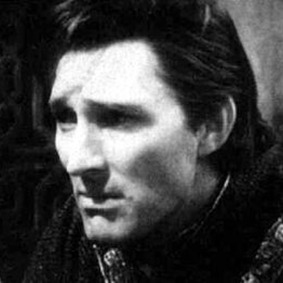
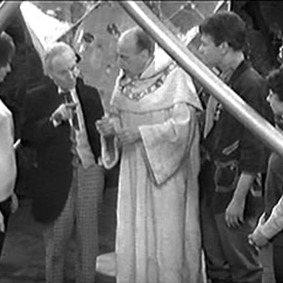



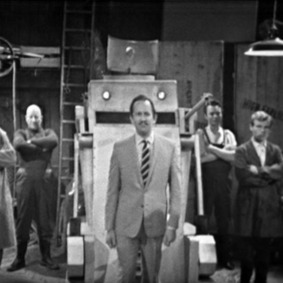

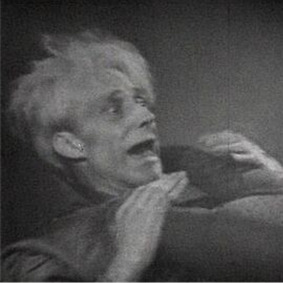

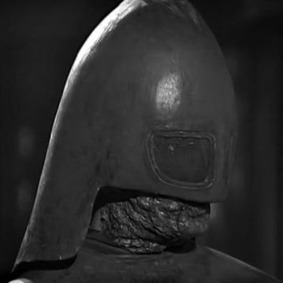
The Rescue and The Ice Warriors tied. These are the 10 stories that were closest to making it through and so have been given a second chance
ROUND 2 MASTERPOST
synopses and propagnada under the cut
Marco Polo
Synopsis
Arriving in Central Asia in 1289, the Doctor and his companions join the caravan of the famous Venetian explorer Marco Polo as it makes its way from the snowy heights of the Pamir Plateau, across the treacherous Gobi Desert and through the heart of imperial Cathay.
Propaganda no propaganda submitted
The Keys of Marinus
Synopsis
The TARDIS arrives on the planet Marinus on an island of glass surrounded by a sea of acid. The travellers are forced by the elderly Arbitan to retrieve four of the five operating keys to a machine called the Conscience of Marinus - a machine capable of influencing all minds on the planet - of which he is the keeper. These have been hidden in different locations around the planet to prevent them falling into the hands of the evil Yartek and his Voord warriors, who plan to seize the machine and use its originally benevolent mind-influencing power for their own sinister purposes.
Propaganda no propaganda submitted
The Rescue
Synopsis
The Doctor, Ian and Barbara arrive on the planet Dido. They find a crashed spaceship, the only two survivors of which are terrorised by the monster Koquillion. But who is Koquillion?
Propaganda
god I love this story, its short and sweet, but the implications, the everything of vicki’s life before the doctor, the firey passion with which I hate bennet is boundless, as is my love for sandy. ITS SO GOOD! VOTE FOR IT! (@sandymybeloved )
The Space Museum
Synopsis
The TARDIS jumps a time track and the travellers arrive on the planet Xeros. There they discover their own future selves displayed as exhibits in a museum established as a monument to the galactic conquests of the warlike Morok invaders who now rule the planet. When time shifts back to normal, they realise that they must do everything they can to avert this potential future.
Vicki helps the native Xerons obtain arms and revolt against the Moroks. The revolution succeeds and the travellers go on their way, confident that the future has been changed.
Propaganda no propaganda submitted
The Massacre
Synopsis
The TARDIS materialises in Paris in the year 1572 and the Doctor decides to visit the famous apothecary Charles Preslin. Steven, meanwhile, is befriended by a group of Huguenots from the household of the Protestant Admiral de Coligny. Having rescued a young serving girl, Anne Chaplet, from some pursuing guards, the Huguenots gain their first inkling of a heinous plan being hatched at the command of the Catholic Queen Mother, Catherine de Medici.
Propaganda no propaganda submitted
The War Machines
Synopsis
The TARDIS arrives in London in 1966 and the First Doctor and Dodo visit the Post Office Tower. There they meet Professor Brett, whose revolutionary new computer WOTAN (Will Operating Thought ANalogue) can actually think for itself and is shortly to be linked up to other major computers around the world — a project overseen by civil servant Sir Charles Summer.
Propaganda no propaganda submitted
The Moonbase
Synopsis
The TARDIS arrives in 2070 on the Moon, where a weather control station under the command of a man named Hobson is in the grip of a plague epidemic — in reality the result of an alien poison planted by the Cybermen. Jamie is knocked unconscious and lapses into a delirium, leaving the Second Doctor, Ben, and Polly to fight off a massive Cyberman attack.
Propaganda no propaganda submitted
The Macra Terror
Synopsis
When the Second Doctor, Ben, Polly and Jamie visit a human colony that appears to be one big holiday camp, they think they have come across a truly happy place. Yet a shadowy presence soon makes them realise that the surface contentment is carefully controlled.
The colony's inhabitants have been brainwashed by giant, crab-like creatures — the Macra. Insidious propaganda, broadcast by the Controller, forces the humans to mine a gas that is essential for the Macra to survive, but fatal to them.
The colony must be saved — but how? The Doctor and his team are up against it, particularly when Ben falls under the influence of the Macra. Can he be rescued from their evil clutches? Can the gas pumping equipment be destroyed, getting rid of the Macra for good?
Propaganda no propaganda submitted
The Ice Warriors
Synopsis
The TARDIS arrives on Earth in a new ice age. The travellers make their way into a base where scientists, commanded by Leader Clent, are using an ioniser device to combat the advance of a glacier.
A giant humanoid creature, called an Ice Warrior by one of the scientists, has been found buried in the nearby glacier. When thawed, it revives and is revealed to be Varga, captain of a Martian spacecraft that landed on Earth centuries ago and is still in the glacier. Varga sets about freeing his comrades and formulating a plan to conquer the Earth — Mars itself is now dead.
Propaganda no propaganda submitted
The Seeds of Death
Synopsis
The TARDIS lands in a space museum on Earth in the late 21st century, where the Second Doctor, Jamie and Zoe learn that contact has been lost between Earth and the Moon. In this era, instant travel — T-Mat — has revolutionised the Earth. Its people have lost interest in space travel. The Doctor and his companions travel to the Moon in an old-style rocket and reach the Moonbase, control centre for T-Mat, only to find a squad of Ice Warriors have commandeered the base and plan to use the T-Mat network to their advantage.
Propaganda no propaganda submitted
28 notes
·
View notes
Text
Shakespeare had more to say. He was nobody’s fool. A further jewel of advice nestles near the center of Hamlet’s third soliloquy. It is like a pearl set into a diamond bracelet. Hamlet broods over the Player King’s emotional display while reciting Aeneas’s tale to Dido. Finally, Hamlet cries out with bitter envy, “What would he do had he the motive and the cue for passion that I have?”
And what would you do, young actor? The spine of a role is the motive (the intellect, the reason); the juice is the cue for passion—the inner switch which ignites the heart. Though we color ourselves with limps and canes, with green umbrellas and purple suits, we cannot escape the motive and the cue.
I'm guessing this passage from Letters from an Actor is why The Motive and the Cue was titled after that particular Hamlet quote.
11 notes
·
View notes
Text
Have you seen this childhood show: Mystery Hunters (2002-2009), Canada (English)




Commentary/Context/Memories: Christina and Araya are my Scully and Mulder.
[Mod A: I did see this show when I was younger (YTV was the GOAT channel <3) and I loved it particularly because it was filmed in Montreal where my Dido lived. I also love shows where they answered viewers questions in a segment, and the mysteries seemed really interesting! I would love to know if this show still holds up (bc I remember really liking the spooky vibe) but it’s so hard to find episodes of it online (especially episodes in good enough condition to understand what they’re saying).]
15 notes
·
View notes
Text
Music recommended and/or mentioned by AURORA!

ABBA - Thank You For The Music
Advanced Language
Agnes Obel - Falling, Catching / Riverside / Dorian / The Curse (Robert Hampson Remix)
Air - Sexy Boy
Alice Phoebe Lou and Olmo - Devil's Sweetheart
Alt J - Fitzpleasure / Hunger of The Pine / Pulsher
Amanda Delara (suggested as an artist she recommends listening)
Amanda Tenfjord (suggested as an artist she recommends listening)
And Still I Rise - Wrecking Ball
Ane Brun - A Temporary Dive / All We Want is Love / Do You Remember
Anna of the North - Lovers
Annie Lennox - No More "I Love You's"
Antônio Carlos Jobim - Samba De Uma Nota Só
A Perfect Circle - The Outsiders / Weak And Powerless / Passive / Thirteen Steps (album)
Asbjørn - The Love You Have in You / Asbjørn
Askjell - The First Goodbye / L O S T M Y C O O L / Sofia
The Beatles - Tomorrow Never Knows / Revolver (album)
Beck - Blue Moon
Beethoven - Moonlight Sonata (Glenn Morrison’s version)
Bee Gees - How Deep Is Your Love
Beverly Glenn-Copeland - Sunset Village
Bjork - Army of Me / Homogenic (album) / Human Behaviour / Hyperballad / Joga / Unravel / Violently Happy / All Is Full Of Love (Howie's Version)
The Black Keys - Lonely Boy
Blondie - Heart Of Glass
Bob Dylan - Emotionally Yours / Political World / Mr. Tambourine Man (live version) (mentioned as the first song she dug)
Cameron James Laing - The Way
Cats of Transistria - Good Night
Céline Dion - My Heart Will Go On (Titanic)
The Chemical Brothers - Another World / Galvanize / Escape 700 / Hanna's Theme
Cher - Believe
Childish Gambino - This Is America
Claude Debussy, Alexis Weissenberg - Claire de Lune (mentioned as a song that impacted her as a child)
Cocteau Twins - Heaven Or Las Vegas
Coldplay - Fix You
College/Electric Youth - A Real Hero (mentioned as the song that got her through her teen angst)
The Cranberries - Dreams
Crystal Castles - Air War / Celestica / Sad Eyes / Untrust Us
Daft Punk - Digital Love
Damien Rice - Cannonball / Delicate / Volcano
Daughter - Youth
David Bowie - Ziggy Stardust / Blackstar (album) / Life On Mars? / Let’s Dance
dePresno - Forever
Dido - Here with Me
Dina Ögon - Tombola 94
DNKL - Hunt
Dolores O'Riordan - When We Were Young
Ed Sheeran- No Diggity vs. Thrift Shop (& Passenger, Kygo Remix) / I See Fire (Kygo Remix)
Edith Piaf - La Vie en Rose (mentioned as a song which makes her cry)
Edvard Grieg - Morning Mood (Morgenstemning) / Solveig’s Song
Enya - Amarantine / May It Be / Storms In Africa / Ebudae / Boadicea / Watermark / The Memory of Trees (album)
Eric Whitacre - Lux Aurumque
EvighetenYoung (suggested as an artist she recommends listening)
Fever Ray - When I Grow Up
Fka Twigs - Water Me
Fleetwood Mac - Big Love / Landslide
Florence + The Machine - No Light, No Light / Rabbit Heart (Raise it Up)
Frankie Valli - Can’t Take My Eyes Off You
Gabrielle - 5 fine frøkner
Gaahls WYRD (suggested as an artist she recommends listening)
Gojira - Explosia / Mouth of Kala (mentioned as a song she loves that might surprise people)
Goldmund - Image-Autumn-Womb
Great News - Now And Them (album)
Grimes - Flesh Without Blood
HALIE (suggested as an artist she recommends listening)
Hans Zimmer - Cornfield Chase
Henry Mancini & His Orchestra And Chorus - Moon River
Howard Shore - The Lord of the Rings: The Fellowship of the Ring: Main Theme (mentioned as a song that she wishes she had written)
Imogen Heap - Headlock / Hide And Seek
Iris - Romance is Dead / lavender and heaven (mentioned as the song she wants played at her wedding)
Japanese Breakfast - Paprika
Jenny Hval - Golden Locks / Mephisto in the Water
John Williams - Hedwig's Theme (mentioned as a song she wishes that she had made)
John Wizards - Tet Lek Schrempf
Jóhann Jóhannsson - Arrival (Original Motion Picture Soundtrack) / Kangaru
Johnny Cash (mentioned as the artist she likes)
Joni Mitchell - Both Sides Now
Kate Bush - Cloudbusting / Babooshka
Khold - Myr
Kimbra - Top of the World
Kishi Bashi - I Am the Antichrist to You
Kvelertak (suggested as an artist she recommends listening)
Lana Del Rey - Young and Beautiful
Leif Vollebekk - Elegy
Leonard Cohen - Famous Blue Raincoat (Live) / Suzanne (Live) / The Partisan (mentioned as an important song which her parents listened to) / You Want It Darker (album) / It Seemed the Better Way / Greatest Hits (album) / Hey, That’s No Way To Say Goodbye
Lorde (mentioned as the artist she would like to collaborate with)
Lou Bega - Mambo No. 5 (A Little Bit Of...)
Madonna - Frozen / Drowned world/Substitute for Love
Madrugada - Majesty
Marilyn Manson - Tainted Love
Massive Attack - Daydreaming / Teardrop
Mastodon - The Hunter / High Road
Masterdon (mentioned as the artist she likes)
Matt Maltese - As the World Caves In
Max Richter - On the Nature of Daylight
Metteson - Under Your Shirt
Miki Matsubara - 真夜中のドア/ Stay With Me
Moby - Porcelain / A Seated Night
Moyka - Colder
Naaz (mentioned as the artist she likes)
Nick Cave & The Bad Seeds ft. Kylie Minogue - Where The Wild Roses Grow
Nick Drake - Pink Moon
Nicholas Hooper - When Ginny Kissed Harry
O. Martin - Nowhere Is Home
Paolo Nutini - Everywhere
Phoebe Bridgers - Smoke Signals
Poliça - Happy Be Fine
Prince - Sexuality
Put Your Hands Up for Neo-Tokyo - Get By
Queen - Under Pressure
Radiohead - No Surprises
RED MOON (suggested as an artist she recommends listening)
RHODES - Turning Back Around
Rockettothesky - Grizzly Man (mentioned as the first song discovered on her own)
Röyksopp & Robyn - Monument
Robot Koch - Nitesky (feat John LaMonica)
Rudimental - Waiting All Night ft. Ella Eyre
Rusted Root - Send Me on My Way
RY X - Berlin
Sarah Brightman - Eden
SEA CHANGE - Above
Secret Garden - Windancer / Windancer
Seigmen - Monument
Sei Selina - Only When You’re Asleep
Sigur Ros - Svefn-g-englar
Silja Dyngeland / Silja Sol - Stemning (DC#27) / Løgneren / Skrubbsår
Silvana Estrada - Lo Sagrado (album)
Sinéad O'Connor - Nothing Compares 2U
Slayer (mentioned as an artist she likes)
Solå (suggested as an artist she recommends listening)Sondre Lerche - Why Would I Let You Go / Wrecking Ball (cover) / Palindromes / Sentimentalist / Lucifer / Bad Law / Patience/ I Love You Because It's True
Strange Hellos (suggested as an artist she recommends listening)
Stromae - L’enfer
Sufjan Stevens (mentioned as an artist she was excited to see at Panorama NYC festival 2016)
Susanne Sundfør - Silencer / White Foxes
Sushi x Kobe (suggested as an artist she recommends listening)
System of a Down - Violent Pornography
Tame Impala - Let It Happen
The Prodigy - Voodoo People / Smack My Bitch Up
The Secret Sisters - Tomorrow Will Be Kinder
Thomas Newman - American Beauty: Original Motion Picture Score
Tigran Hamasyan + Arve Henriksen + Eivind Aarset + Jan Bang - Hoy, Nazan / Holy
Tool - Aenema
Underworld (mentioned as an artist she’d collaborate with) - Born Slippy / Rez / To Heal / 1992-2012 (album she would put it at a rave party as a DJ) / Born Slippy (mentioned as the song that she listened to the most when she first started driving)
Vilde Tuv - Cellevevet / Det blåser ingen vinder inni huset
Wardruna - Yggdrasil (album) / Runaljod - Ragnarok (album) / Fehu / Algir-Tognatale
WDSTCK - Flowers
Wim Mertens - Iris
Wintergatan - Sommarfågel
Woodkid - Iron
Wolf Alice - How Can I Make It Ok?
The XX - Intro
Young Dreams (suggested as an artist she recommends listening)
And overall music without words like soundtracks, movie pieces or classical music
Sources (in no particular order and some might be missing as I’ve been working on that since February 2021):
“Aurora feirer Grieg” on NRK 2018, i-D interview “city guide: bergen with aurora”, INDIE mag interview “BLESSING OUR EARS WITH AURORA’S DEBUT ALBUM” 2016, Records In My Life (interview 2016), 2014 interview for GAFFA, Auto-Tune Interview for DIFFUS 2019, Aurora guest programs Rage 2019, NRK radio show “AURORA Up Close” 2017, “Like A Bird In The Night: Clash Meets Aurora” 2019 interview, Spotify Greenroom Wrapped 2021 With AURORA and Sub Urban, Mixtape with the songs for Kzradio, #TBT Mixtape for Billboard, 2016 Artist Survey: AURORA for Under the Radar, Records In My Life (2019 Interview), Nordic Playlist #83, Nine Songs: AURORA for The Line of Best Fit 2019, NPR’s Guest DJ: AURORA On Her Love Of Heavy Metal And Leonard Cohen 2016, IG story from March 2020, IG story from September 2021, Interview - Panorama NYC 2016, Tweet from 2016, Spotify's music & talk show 10 Songs That Made Me 2021, Playlist for Weibo 2022, Interview for NRK 2014, Interview with Jamie Taylor 2016, Playful Playlist for i-D 2022, Midnight Mixtape for Deezer 2021, Daydreaming playlist for HIGHJINKX 2021, ChillDaBeats #038 2021, AURORA’s official SoundCloud channel, NRK P3 - Plateprat (record talk) 2017
Special thanks to Amroth for the support and additional resources provided! 🖤
#aurora#aurora aksnes#recommendations#can't believe I finally finished it happy holidays to all warriors hope you find this useful!
137 notes
·
View notes
Photo

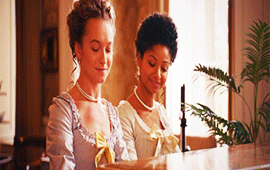

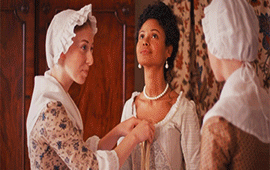
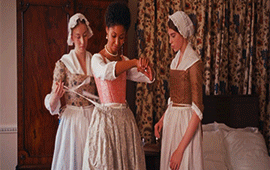
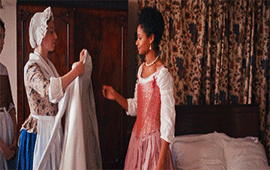
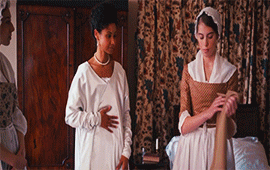



YouTube GIFs || Crows’ Eye Productions: Getting Dressed in the 18th Century — Dido Elizabeth Belle (1779)
In the later 18th century, two young women grew up together at Kenwood House, near London. Such was the affection in which the two young women were held, that their uncle, Lord Mansfield, commissioned a joint portrait of them from the accomplished Scottish portraitist, David Martin. Dido Belle and Lady Elizabeth Murray came into the care of Lord and Lady Mansfield when they were both very young; Elizabeth after the death of her mother and Dido at the request of her father, Captain John Lindsay.
… Dido was born in England. Her father, Maria Belle, was an enslaved African woman who had become the mistress of Captain Lindsay. Her mother’s history remains uncertain, but Dido and Elizabeth were cousins and they were cared for, educated, and loved equally by Lord and Lady Mansfield. … Dido Belle, loved and respected by her uncle, Lord Chief Justice Mansfield whose rulings in cases of slavery paved the way for abolition, may be more important than we can ever know.
#historyedit#crows eye productions#18th century fashion#historical fashion#dido elizabeth belle#youtube gifs#nanshe's graphics
86 notes
·
View notes
Text

like/comment (if you are a multi) for a one-line starter
other period drama muses
francis valois (reign with some historical influences)
Sebastian de poitiers (reign)
charlotte heywood (sanditon)
lord babington (sanditon)
young stringer (sandtiton)
tom jones (tom jones 2023)
henry tudor (7th) (the white queen/the white princess/the spainsh princess with some historical influences)
richard plantagent (the white queen with some historical influences)
elizabeth woodville (the white queen/the white princess with some historical influences)
anne shirley cuthbert (anne with an e)
marie antoinette( marie antoinette (itv/pbs 2023) with some historical influences)
(king) louis bourbon (16th) ( marie antoinette (itv/pbs 2023) with some historical influences)
captain henry ossroy (mr malcom’s list)
selina dalton (mr malcom’s list)
dido elizabeth belle (belle movie 2013)
#&&starter calls:general#thought we built a dynasty that heaven couldn't queue up#&&starter call:period drama
10 notes
·
View notes
Text
~ It looks like Briseis and Dido are sitting together in Amphitrite’s palace. It seems they both have collectively decided not to go back to Thetis’s manor with everything that’s happened. Despite being still relatively young, only appearing to be about 15 now, Dido is dressed very fancily, like a princess. Remember, Thetis said they would pass on their title as lead Nereid to Dido when they died. Dido just didn’t expect it to be so soon. She looks so exhausted. Briseis just sits next to her and lets her lean on her shoulder. ~
It’ll be okay. You’re doing great, Amphitrite really appreciates all you’ve been doing. Thetis would be proud.
4 notes
·
View notes